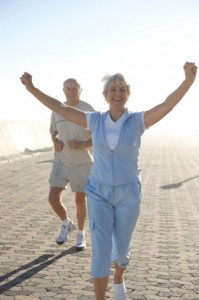 The ancient Greek physician Hippocrates may be well-known for his saying, “Let medicine be thy food, and food be thy medicine,” however he also said, “Walking is man’s BEST medicine.” It does not matter where in the world they live, their altitude, climate, or culture, all centenarians we have interviewed walk as a part of their daily routine.
The ancient Greek physician Hippocrates may be well-known for his saying, “Let medicine be thy food, and food be thy medicine,” however he also said, “Walking is man’s BEST medicine.” It does not matter where in the world they live, their altitude, climate, or culture, all centenarians we have interviewed walk as a part of their daily routine.
The long-lived people do not have cars, so for the most part they get around by foot, and can often be seen heading out daily to get their food and supplies, socializing with neighbors or family, or going to their gardens. They walk at least thirty minutes as a daily activity and most walked more than an hour.
While in Symi, Greece, an island known for its robust long-lived people, we interviewed Nicolas, who is “more than 97.” When asking him what he attributed his longevity to I remember him slapping his thighs, declaring they were his mode of transportation and proudly sharing that he had never been in a car, on a motorcycle or a scooter. 110 year old Bernando told us he walks two miles daily in the park near his home in Mesa, AZ.
The benefits of walking have been celebrated for centuries, and have even proven equal to vigorous exercise in many cases. Walking helps to substantially reduce the risk of diabetes, stroke and heart disease, lowers your cholesterol, and blood pressure, and a federal government report called “Stepping Out” notes that walking also reduces the risk of developing age related degenerative diseases such as osteoporosis, colon and breast cancer, and helps to maintain normal weight, healthy bones, muscles and joints.
What may contribute most to the anti-aging benefits of walking is the increased production of human growth hormones that counteract the effects of aging. An increase in the natural production of the “youth hormone” means increased muscle mass and strength, decreased fat deposits, more mental alertness, better sexual enjoyment, and elevated moods. Walking strengthens reflexes making the long-lived less prone to debilitating accidents like falling and it increases the production of endorphins which reduce feelings of depression and anxiety, while promoting a sense of well-being, explaining in part why the long-lived people are so happy.
Even in our hectic daily lives, we can find ways to get in a little walking every day by walking 15 minutes in the morning before work, getting off the bus one stop early, taking 15 minutes of your lunch break to walk around the block. Choosing the stairs over the elevator, and when you need to go to the bathroom at work, walk up the stairs to the floor above you and use that bathroom instead.
When you are traveling, walk laps in the airport, skip the moving escalators and walkways, instead opting for the stairs or the long hallway before and after flights. Use the stairs in your hotel and walk to your meetings instead of taking a cab. In the cold, walk in a shopping mall or museum, or perhaps combine your daily walking with an activity like volunteering as a guide.
Take a walk this morning for some fresh air and a clear mind before you head out to face your day and again tonight, after dinner, to unwind and relax after a full day, and begin “Walking your way to A Longer Healthy Life.”












